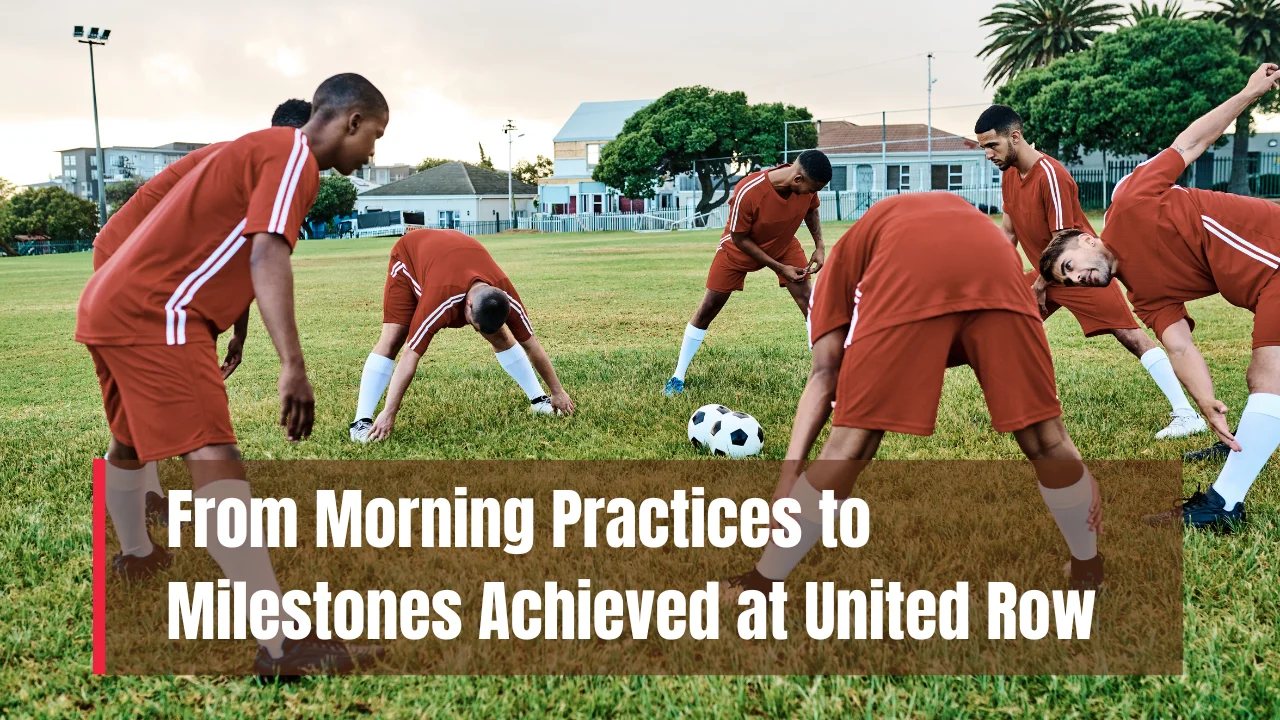United Row: United Row is more than a training program—it’s a lifestyle that pushes athletes to not only perform at their peak but also prepare for the challenges that await them off the water. For student-athletes, managing time is one of the hardest things to master. Between early practices, academic pressure, and personal responsibilities, many young athletes feel stretched thin. This is where United Row steps in—not just to train rowers, but to equip them for life.
This article explores how United Row shapes well-rounded individuals through consistent discipline and structured routines. You’ll discover how the program teaches time management in a real-world context and why those lessons have a lasting impact beyond the sport. From day-to-day habits to long-term personal growth, we’ll take a deep look into the framework that makes United Row a powerful influence on and off the water.
How United Row Builds Time Management Skills for Long-Term Success
At the heart of United Row is the belief that discipline and structure are essential for developing strong time management skills. The program is designed to challenge student-athletes to take ownership of their schedule, prioritize wisely, and stay accountable to their goals. By combining athletic training with academic expectations and personal growth, United Row ensures athletes become independent, focused, and ready for life beyond sports. These core time habits are not just about better performance—they’re about building a mindset that lasts a lifetime.
| Overview of Time Management Lessons at United Row |
| Structured daily routines encourage time awareness |
| Balanced focus on academics and athletics |
| Emphasis on team accountability and punctuality |
| Goal-setting practices to build forward planning |
| Time-blocking techniques introduced in training |
| Reflective tools for personal development |
| Prepares athletes for careers and responsibilities |
| Encourages discipline that extends beyond rowing |
The Role of Structure in United Row’s Training
Structure is a non-negotiable part of life at United Row. Each day is carefully planned to keep athletes moving with purpose. From early morning water sessions to evening study hours, every activity is timed and intentional. This not only keeps athletes on track but teaches them how to plan their own days. Having a predictable routine helps eliminate decision fatigue and builds mental discipline. It’s this kind of environment that teaches young people how to balance responsibilities and make the most of their time.
More importantly, athletes aren’t just told what to do—they’re taught why structure matters. They begin to notice the difference in energy, performance, and mood when their time is well-managed versus when it’s wasted. That awareness is the first step in turning routine into long-term habit.
Balancing Sports and Studies
At United Row, athletic success isn’t the only goal. Athletes are also held to high academic standards, and that’s where time management really shows its value. Student-athletes quickly learn how to navigate full schedules without compromising performance in the classroom or on the water. They’re encouraged to prioritize tasks, break down larger assignments, and use short time windows productively.
This constant balancing act teaches skills many young people don’t develop until college or later. By managing schoolwork alongside a demanding training regimen, athletes gain the ability to handle pressure, set boundaries, and avoid last-minute stress. These lessons are especially critical for teens learning how to juggle responsibilities in an increasingly busy world.
The Power of Accountability
What sets United Row apart is its strong culture of team accountability. Time management isn’t treated as a personal issue—it’s a shared responsibility. When one athlete is late or unprepared, the entire team feels the impact. This peer-driven system fosters a deep respect for time and reinforces the idea that reliability matters.
This environment teaches athletes not just to manage time but to value it. Being on time becomes a sign of commitment. Athletes learn to respect others’ schedules and develop a sense of urgency about their own goals. These are skills that carry over naturally into college group projects, internships, and eventually, the workplace.
Goal Setting and Time Tracking
United Row doesn’t just focus on daily discipline—it teaches athletes to think ahead. Each athlete works with coaches to set short-term and long-term goals, both in rowing and in academics. These goals are broken down into manageable steps and tracked regularly, allowing athletes to stay focused and adjust as needed.
This practice teaches one of the most important time management skills: the ability to connect daily actions with bigger outcomes. Instead of floating through the day, athletes learn to use each hour intentionally. They start seeing time not as something to fill, but as a limited resource tied to their growth.
Time Management Tools and Techniques
To support these habits, United Row incorporates practical tools that athletes can use both inside and outside of training. These include:
- Time-blocking: Scheduling tasks hour by hour to stay organized and focused
- Task prioritization: Identifying the top 3 goals for the day
- Progress journals: Reflecting on what worked and what didn’t each week
- Weekly planning sessions: Reviewing commitments and mapping out the upcoming week
These tools help athletes become more self-aware, track their development, and identify time-wasters before they become habits. These methods also prepare them for managing complex schedules in college or professional life.
Building Life Skills Through Routine
The consistent routine at United Row does more than improve rowing performance—it shapes character. Athletes gain confidence from mastering their schedule. They become less reactive and more intentional. By showing up every day, managing their energy, and staying organized, they’re building critical life skills that apply far beyond their time in the sport.
The daily grind teaches self-discipline, mental resilience, and emotional control. These qualities are key to succeeding in any environment, whether it’s a demanding job or a tough academic program. In short, United Row helps athletes grow into capable adults.
Two Core Time Management Lessons from United Row
1. Prioritization of What Truly Matters
Athletes learn how to distinguish urgent tasks from important ones. This helps them focus on actions that drive long-term success rather than just reacting to what’s right in front of them.
2. Avoiding Time Traps
Through regular coaching and journaling, they learn to spot and eliminate distractions—such as excessive screen time or procrastination—that steal focus and reduce productivity.
Preparing for a Career After Sports
Not every athlete continues in sports beyond high school. That’s why United Row invests in preparing its athletes for life after competition. With strong time management skills, they enter the next phase of life more prepared than most of their peers. Whether pursuing higher education or starting a job, these athletes know how to stay organized, meet deadlines, and manage their responsibilities.
This foundation helps them become dependable employees, successful students, and balanced individuals. Employers often seek out former athletes for their discipline and work ethic—traits that United Row helps to sharpen early on.
Teamwork and Time Respect
Rowing is one of the few sports where timing is everything. If one rower falls out of sync, the boat slows down. This mirrors the real-world importance of time respect in group settings. At United Row, being on time isn’t about avoiding punishment—it’s about showing commitment to the team. That mindset instills habits that shape leaders who respect others’ time and understand the value of punctuality.
Lifelong Benefits of United Row’s Training
The most valuable lesson athletes take from United Row isn’t a rowing technique—it’s the understanding that how you spend your time shapes who you become. Time management becomes part of their identity. Whether navigating career shifts, raising families, or pursuing personal goals, they fall back on the structure and habits developed through the program.
FAQs
What age group does United Row train?
United Row primarily trains high school and college-level student-athletes focused on developing both athletic and life skills.
Do athletes use digital tools to manage their time?
Yes, many are introduced to calendars, reminders, and planning apps to organize their schedule and build routine.
Can time management from sports apply to school or work?
Absolutely. The same skills that help athletes train efficiently also help them excel academically and professionally.
How long does it take to build strong time management habits?
Most athletes begin to see improvement within a few weeks, but long-term success comes from consistent practice over months.
Is United Row only for competitive rowers?
No, it’s open to anyone committed to personal growth, discipline, and team development through rowing.
Final Thought
United Row is more than a training ground—it’s a blueprint for lifelong success. By mastering time management, athletes leave the program equipped to handle whatever life throws at them. These are not temporary lessons; they’re permanent advantages. If you’re ready to grow beyond your limits, discover what United Row can teach you—not just about rowing, but about life.












